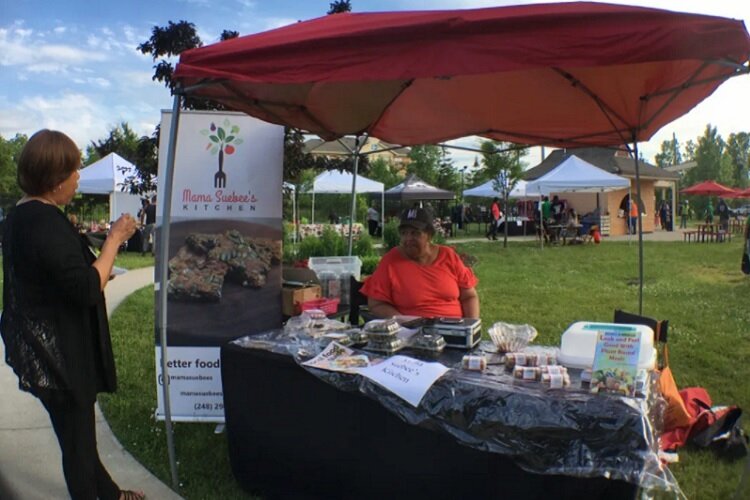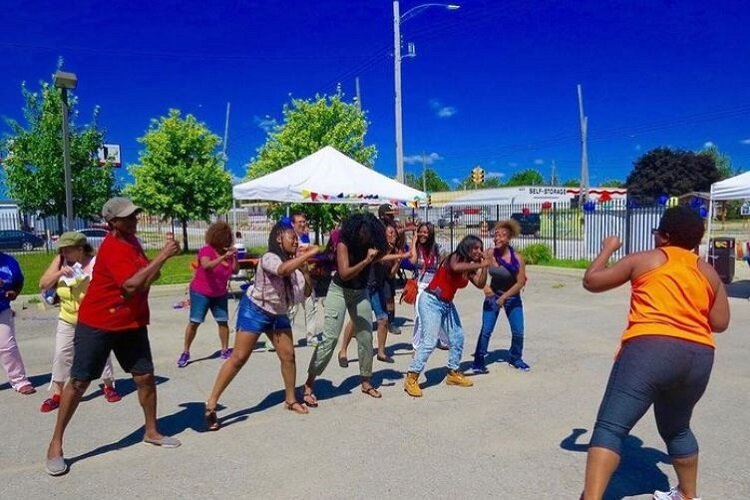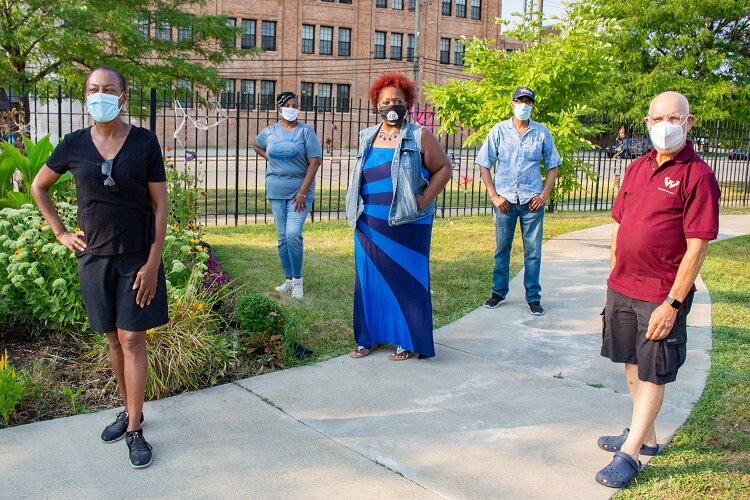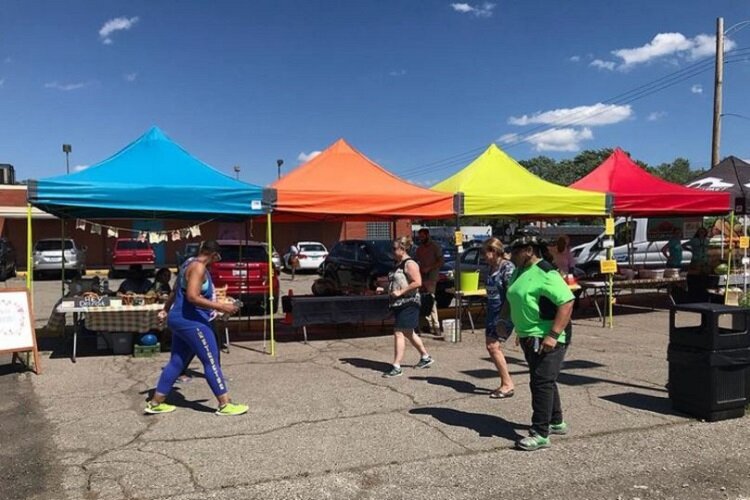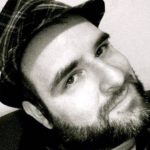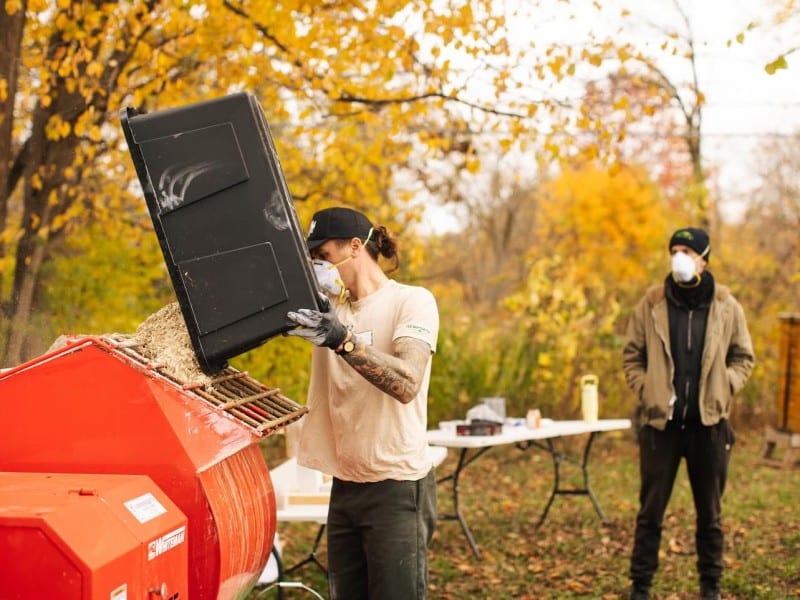Resilient Neighborhoods: How two Detroit nonprofits are bringing community into community health
These two Detroit community development organizations are doing their best to put the community back in to community health programming.
When Gwenda Richmond has a health question, she knows just where to go. For the last fifteen years or so, the retired bank worker has been participating in a type 2 diabetes support group sponsored by Detroit’s Joy Southfield Community Development Corporation (JSCDC).
For most of the time she’s been involved, participating has meant taking a short trip from her home in Southfield to the nonprofit’s headquarters on Detroit’s west side. More recently it’s meant participating over Zoom. But, regardless of the format, the
“If I wasn’t in this class, I do not know what I would do.”
group is a wonderful place for her to get answers to questions on a whole variety of issues from nutrition to the side effects of medication she might be taking..
“They talk about diseases, blood sugars, blood pressure, and all kinds of medical stuff like that,” she says. “You can go there with any type of problem, any kind of question, doesn’t matter. None of them are stupid. They take time and they give you the answers.”
The group is called HEAL, an acronym that stands for Health, Eating, Activity, and Learning. Members currently meet online the first Thursday of each month from 3 to 4 pm. Past topics covered at HEAL sessions include: setting healthy goals, how to read nutrition labels, chair exercises, ways to incorporate more physical activity into your day, and mental health tips.
The classes have also helped Richmond get in better shape. Back before the pandemic, the in-person classes were always followed by an exercise routine. And members are encouraged to walk regularly by another “walking buddy” from the group that have partnered up with them to help keep them on their toes. When she first started, Richmond had difficulty walking to the end of her driveway. But now with the regular support of her walking buddy, she’s increased her daily step count from 300 to more than 3,000.
HEAL also offers emotional support for its members. Two years ago, Richmond learned her sister had just passed away while she was attending a group session. Hearing of her loss, the instructors and other members responded with great sympathy.
“They were very supportive,” says Richmond. “They gave their input. They did everything. It was just like a family.”
Beyond that, Richmond feels the camaraderie and structure HEAL offers have really helped her feel connected and focused on keeping healthy.
“If I wasn’t in this class,” she says. “I do not know what I would do. It’s keeping me grounded.”
Farmstands & Healthy Lifestyles
The role Detroit nonprofits play in supporting the health and well being of the neighborhoods they serve can be quite powerful. For Joy Southfield CDC, community health is a top priority, and HEAL is just one of many programs it sponsors to keep local residents healthy.
The community development nonprofit got its start running a free medical clinic at 18917 Joy Road, which opened in 2001. While health education has long been a part of its work, JSCDC reoriented itself to more fully concentrate on addressing the social determinants of health after Covenant Community Care took over the operation of the clinic in 2014.
The nonprofit now focuses its energies on promoting healthy lifestyles and preventative health care measures for Detroit’s District 7 region, a family-oriented
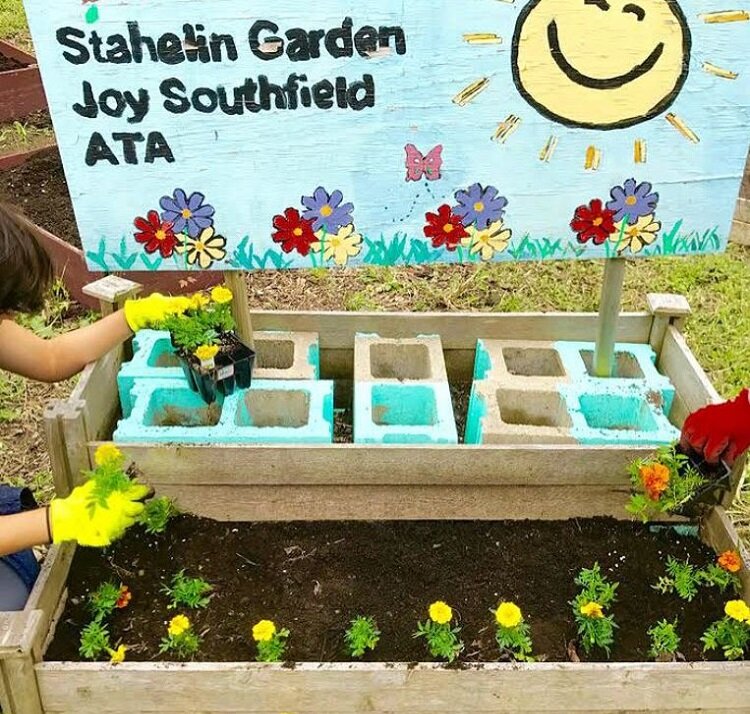
residential area that encompasses the neighborhoods of Cody Rouge and Warrendale. While the majority of the population there is African-American, it’s a multicultural area with a sizable community of immigrants from the Middle East.
Diabetes is a common condition in District 7, so the nonprofit established the group that became HEAL about a decade-and-a-half ago.
“People had the condition, but they weren’t managing it well,” says Tricia Blake-Smith, director of community health for JSCDC. “So we started the support group that’s still well attended. They can just talk about managing their disease and give each other some assistance and hope.”
The nonprofit has also held workshops for other chronic conditions like asthma, COPD and heart disease in the past and is now considering setting up similar support groups for people suffering from those maladies.
Beyond that work, JSCDC has also sponsored free aerobics classes and a youth enrichment program promoting physical fitness, gardening and healthy lifestyles.Both those programs are currently on hold due to COVID-19.
Perhaps the most well-known community health initiative it sponsors, however, is the
Sowing Seeds Growing Futures Farmers Market. Located at Joy Road and Artesian Street, it takes place Tuesdays, 3 to 6 pm, from June to October.
Although District 7 isn’t exactly a food desert, there aren’t a lot of places to get high-
“There has been a crisis going on, but we just want people to know we are here.”
quality fresh fruit and vegetables there. JSCDC started the market to make these foods, which are an important part of a healthy diet, more accessible to residents.
“We wanted to level the playing field of having the right nutrients on hand,” says Blake-Smith. “It’s a way to have the local produce vendors come, and residents don’t have to go anywhere. They just know it’s on Tuesdays in the summer.”
In addition to having fresh produce available for purchase, JSCDC has traditionally sponsored healthy cooking demos at the market and passed out nutritional and health education information, recipes and samples to passerbys.
The Sowing Seeds Growing Futures market has been operating annually since 2007, with the exception last year when it went on hiatus due to the pandemic. As an alternative to regular market in 2021, JSCDC provided residents with produce boxes funded by a grant from Eastern Market. Last year, it distributed 100 boxes during an eight-week period and also provided PPE materials like masks and hand sanitizer to residents during pick-ups.
The farmers market also served as the backdrop for JSCDC’s Healthy Prescription program, which allowed participants to get prescriptions for fresh produce from physicians. Until last year, those involved would enroll in a six-week program that earned them $15 in credit towards fresh produce. Participants would get the food credits after taking part in a short health education lesson at the market. Due to COVID-19, the nonprofit is offering the education lessons online in 2021.
This year, when JSCDC reopens the farmers market, it will be offering a hybrid version of its health education lessons. Participants will be able to choose whether they want to engage in the sessions virtually or in-person, whatever they feel safer doing. Social distancing measures and other safety precautions will also be in place at the market to keep people safe.
Beyond what’s happening at the market, though, Blake-Smith wants to remind people that Covenant Community Care is still offering COVID-19 testing and vaccinations at the clinic. And despite the challenges of COVID-19, her organization remains dedicated to helping the meet the health needs of the community it serves..
“We are here to make an impact for a healthier community,” she says. “We’re here to support the residents to make a thriving community. There has been a crisis going on, but we just want people to know we are here.”
Holistic Approaches & Health Democracy
Joy Southfield CDC isn’t alone in its efforts to promote these kinds of health efforts in Detroit. Closer to the center of the city, Hope Village Revitalization has also been working to realize its own vision of community health.
“It’s a pretty comprehensive view of community health,” says Stephanie Johnson-Cobb, deputy director of HOPE Village Revitalization. “We know in neighborhoods, many systems come together to impact community health,” so we’re looking at our built environment, how our neighborhoods interact with the environment, whether or not our communities are equipped to allow mobility and physical activity, access to fresh and healthy foods, access to healthcare.”
HOPE Village Revitalization (HVR) is a nonprofit that split off from Focus: HOPE and is now a resident-driven organization that serves a 100-block area called HOPE Village. Bounded by Dexter Avenue, Hamilton Avenue, Lodge Service Drive and the Conrail railroad corridor, the neighborhood is roughly one-square-mile and home to around 5,000 people, predominantly African Americans.
HVR’s focus on health and nutrition came about as a result of a community strategic plan that developed with the input of residents, when HVR became its own independent nonprofit, with access to fresh produce being an important point of concern.
With its holistic view of community health, HVR sees the DTE Energy assistance program it oversees, which helps residents gain access to new furnaces and water
“We developed a facebook page that provides our community with resources for health and healthy living, exercise, walking paths, and COVID information.”
heaters, and sharing information about rental assistance as being health-related issues.
Like JSCDC, HOPE Village Revitalization also operates its own farmers market. Now slated to run for its fourth year, it takes place Wednesdays, 3 to 7 pm, from June to September.
“It’s a gamechanger to have these fresh, sometimes organically grown, vegetables from local farmers,” says Cobb-Johnson. “And we have health screenings, nutritional education, music, movement, fun, and the ability to engage community members around different issues.”
Similar to Joy-Southfield CDC, HVR has also been delivering fruits and vegetables to local residents during the pandemic with the assistance of Eastern Market. Through about mid-March of this year, it supplied community members with over 600 boxes of produce like broccoli, sweet potatoes, onions, green beans, apples, and oranges. The nonprofit is currently looking into getting funding to continue that program. During the pandemic, it’s also been active in distributing masks and hand sanitizers.
One of the more interesting community health initiatives HOPE Village Revitalization has been involved with is a democratic health project called HOPE Village Citizens for Health (C4H). The project is a collaboration between HVR, Wayne State University, the Urban Learning and Leadership Collaborative, and HOPE Village residents that is working to identify and address different health issues the community is facing. It’s grounded in the Kettering Foundation’s model of deliberative democracy, in which discussion and careful decision-making play a central role to civic engagement.
To help realize this model in HOPE Village, Citizens for Health trained four residents community facilitators. With Wayne State staff and interns, they then conducted 63 interviews with residents to find out their thoughts about issues like asthma (especially among children), maternal-infant health, diabetes, obesity, lack of nutritious food, heart disease, and high blood pressure. Based on the needs they discovered through this research, the project group decided to build an online health information hub called HOPEVillage 360. It’s designed to keep residents informed about local resources.
“We developed a facebook page that provides our community with resources for health and healthy living, exercise, walking paths, and COVID information,” says Lisa Robinson, a neighborhood resident and HVR board member active with Citizens for Health. “We’re trying to build it so all the things that the community wants to see, they can go to that Facebook page and gain access to those resources.”
Robinson, a local beekeeper, has been involved with Focus: HOPE and HVR for many years. She also runs a booth at the farmers market that sells honey and has a sample hive to educate other community members about the pollinating insects.
Unfortunately, over the past year, Robinson unexpectedly had to deal with some unexpected health challenges. She’s dealing with them the best she can, though, and has found her work with Citizens for Health to be helpful to meeting her new health needs.
“It seems that some of the education that we’ve been bringing to the other residents has helped me,” she says. “And so if it helps me, I know it can help someone else. I’m really proud of the work we are doing and looking forward to what we can do in the future.”
As part of its collaboration with Citizens for Health, HVR is also interested in bringing a community health worker (CHW) to HOPE Village to assist residents with health concerns. This initiative draws inspiration from a peer-based community health care model that aims to break down barriers to access and trust by allowing community members to play a role in educating and supporting other residents’ health needs.
“The CHW will be a local resident who will be trained and embedded at HOPE Village Revitalization,” says Stephanie Johnson-Cobb. “He or she will work with several neighborhood ambassadors from C4H to provide trusted non-medical one-on-one and group support for neighborhood residents in order to impact health outcomes for children with asthma and adults with heart ailments.”
The community health worker will be actively engaged in the HOPE Village neighborhood, building awareness of heart and asthma issues, leading neighborhood walking and hustle clubs, coordinating health fairs, and working to bring healthy home kits to local families who have asthma sufferers.
The peer-based community health model is a relatively new way of looking at health care, and HVR hopes that their efforts will shed new light on how community health workers can help to engage neighborhood residents. And while this project may seem a little out-of-the-box, it makes a lot of sense in the holistic context of HOPE Village Revitalizations approach to community health.
“Health is about your physical, your social, and mental well being. We’re trying to address all of those things,” says Johnson-Cobb. “We are really striving earnestly to have an equitable and sustainable community that provides a high quality of life for all.”
Resilient Neighborhoods is a reporting and engagement series that examines how Detroit residents and community development organizations are working together to strengthen local neighborhoods. It’s made possible with funding from the Kresge Foundation.
